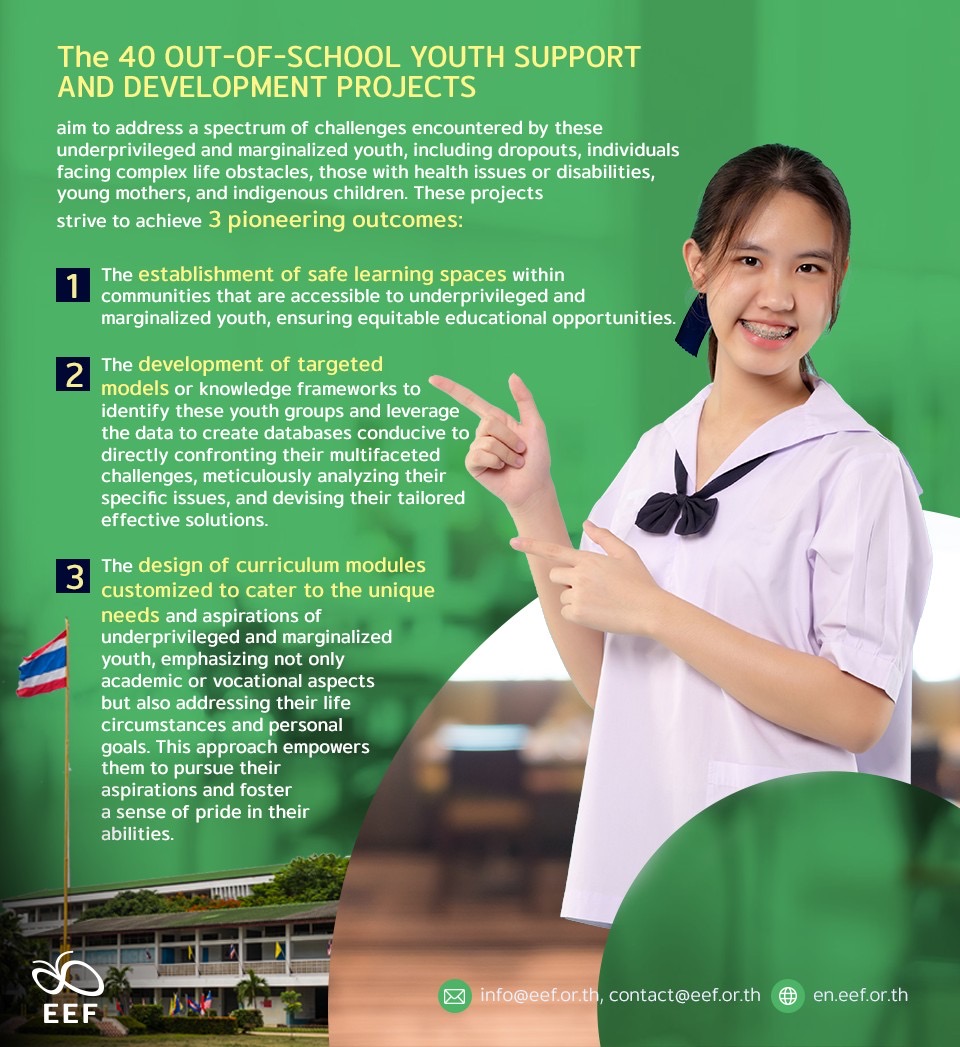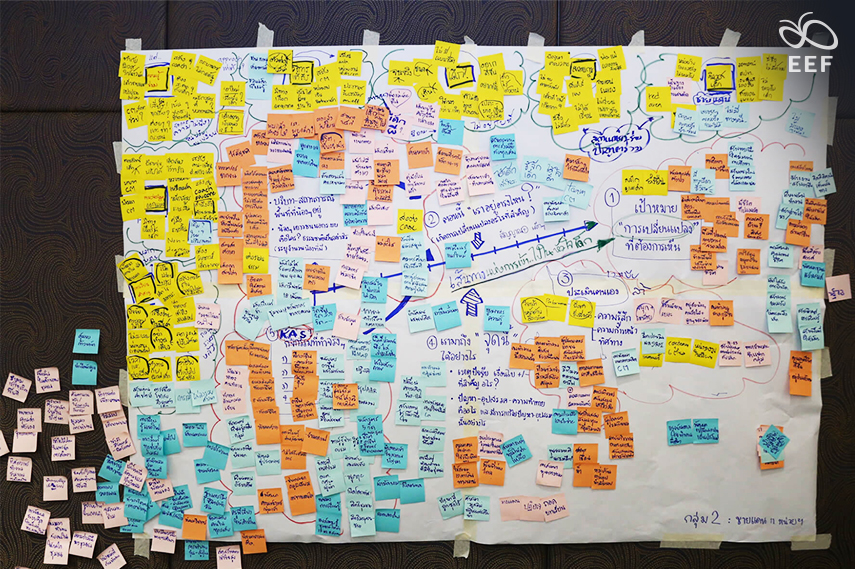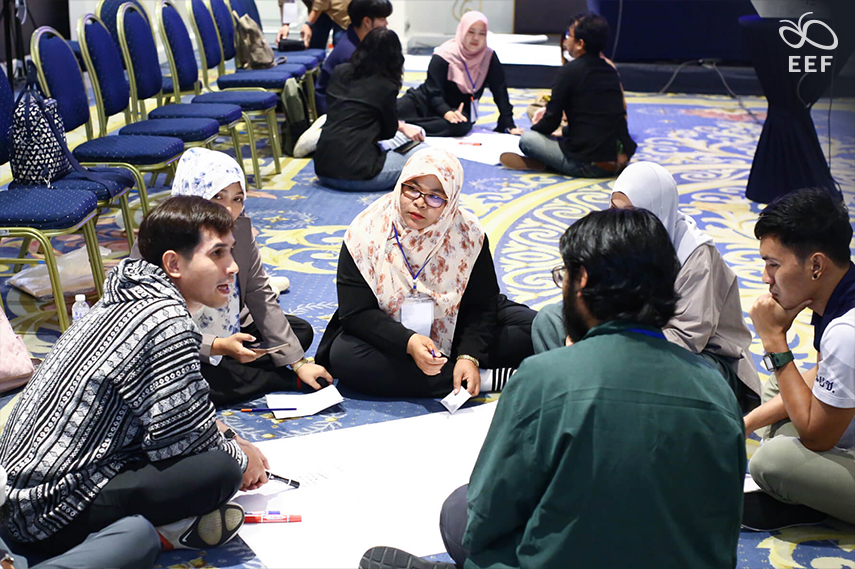
In the “Stories Along the Way: Steps Forward” workshop hosted by the Equitable Education Fund (EEF) Thailand the progress of 40 projects aimed at supporting and developing youth outside Thailand’s formal educational system was discussed. With approximately one million youth falling into this category, projects employing qualitative approaches have been implemented in alignment with the ethos of the EEF’s “Thailand Zero Dropout” initiative: reducing dropouts down to zero. These projects are meticulously crafted to target the most vulnerable groups within their respective areas, while continually adapting to the ever-evolving challenges they face.
Driven by the imperative of addressing future societal issues, the discussions’ spotlights were on qualitative interventions tailored to the unique challenges of each of the four groups — adolescent parents, border community members, youths requiring safe environments and learning ecosystems, and urban community members — with a keen emphasis on monitoring progress to make tangible impacts in the lives of these out-of-school youths. The resulting methodologies have been carefully compiled and presented to pertinent agencies for practical implementation and further refinement, aiming for comprehensive coverage and maximum effectiveness. The overarching goal is to put an end to abrupt youth dropouts and facilitate their seamless reintegration back into the educational system, with a focus on personalized educational models that account for individual lifestyles and circumstances, while also establishing mechanisms for ongoing improvement.

The 40 out-of-school youth support and development projects aim to address a spectrum of challenges encountered by these underprivileged and marginalized youth, including dropouts, individuals facing complex life obstacles, those with health issues or disabilities, young mothers, and indigenous children. These projects strive to achieve 3 pioneering outcomes:
1. The establishment of safe learning spaces within communities that are accessible to underprivileged and marginalized youth, ensuring equitable educational opportunities.
2. The development of targeted models or knowledge frameworks to identify these youth groups and leverage the data to create databases conducive to directly confronting their multifaceted challenges, meticulously analyzing their specific issues, and devising their tailored effective solutions.
3. The design of curriculum modules customized to cater to the unique needs and aspirations of underprivileged and marginalized youth, emphasizing not only academic or vocational aspects but also addressing their life circumstances and personal goals. This approach empowers them to pursue their aspirations and foster a sense of pride in their abilities.

Insights gleaned from the work of different units associated with these 40 projects underscore the necessity of flexible work plans to address the access challenges confronted by out-of-school youth. Persistent hurdles have been observed in reaching youth, necessitating constant adjustments to promptly engage with them and overcome delays and difficulties in locating them. It has become evident that there is no universal, one-size-fits-all solution, as access to youth relies on various local government agencies or community mechanisms, thereby varying across different communities. Moreover, understanding the psyche of these youth requires distinct efforts, emphasizing the importance of detailed and nuanced approaches. Central to these discussions is the human element, emphasizing the need for interpersonal communication to establish trust and cooperation with these youth groups, enabling them to willingly provide information and accept assistance.
At the core of the current practical workshop is the pivotal recognition that all 40 units have been grappling with highly sensitive and intricate groups; working with out-of-school youth demands meticulous attention, as each area presents its own set of unique challenges. Once access to these youth is secured, the intricate web of their multifaceted issues becomes apparently palpable. Drawing insights directly from the youth themselves, data is tailored to provide continuous care, akin to the delicate task of custom-fitting clothes for each of them — yet again, acknowledging the absence of a one-size-fits-all solution; no single formula suffices for addressing the diverse needs of these individuals.

The discussions echo the real experiences of each of the units, fostering an exchange of perspectives to craft overarching work mechanisms. Addressing adolescent parents necessitates a holistic approach, encompassing both the mental and physical well-being of both the parents themselves and their children, including nutritional and environmental considerations. In border areas, where cultural, ethnic, and human rights issues intertwine with access to quality education and substance abuse challenges, a paradigm shift has been proposed, with the areas being envisioned not merely as problem hubs, but as fertile grounds for creative environmental systems.
Efforts to establish safe environments and learning ecosystems underscore the urgent need to revitalize public spaces, catering to out-of-school youth amidst societal shifts, with an emphasis being placed on fostering collective ownership and recognizing the pivotal role of safe environments in bolstering community resilience. Amidst expanding urban sprawl, the rise in urban poverty and out-of-school youth in urban communities has been acknowledged, prompting exploration into empowering residents to articulate their real issues and design targeted solutions. The reflections from each of the discussions underscore the necessity for nuanced, community-centered approaches to address the unique challenges facing out-of-school youth. Shared among these discussions is a stress on the significance of continuous care, tailored interventions, and community engagement in nurturing sustainable solutions.

As the “Stories Along the Way: Steps Forward” workshop concluded, it left an enduring impact on youth education and empowerment in Thailand. Through dynamic discussions and subsequent innovative solutions, the workshop has embodied the Equitable Education Fund’s (EEF) Thailand mission of fostering equitable education; by addressing the needs of vulnerable groups and tailoring interventions to their challenges, it has significantly contributed to the Thailand Zero Dropout initiative, with the methodologies developed holding promise for transforming the lives of countless youth, ensuring equal access to quality education for all. The workshop stands as a testament to the EEF’s dedication to leaving no child behind and ensuring that every step forward is a step towards a brighter and more equitable future for all.

